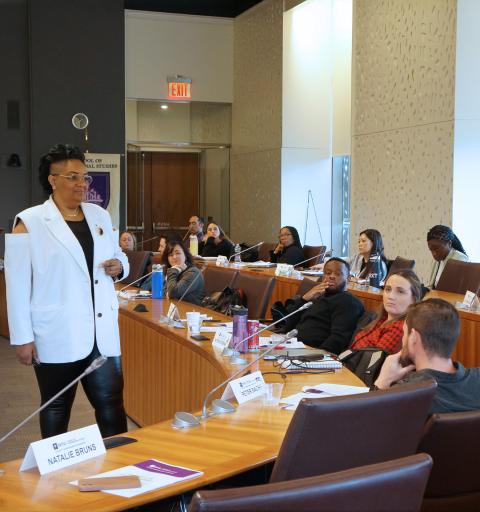
Not Leadership As Usual
Tackling Today’s Most Urgent Leadership Questions
Program Highlights & Global Presence
Leading in an Era of Radical Transformation
Through interactive sessions, real-world case studies, group exercises, simulations, and relationship-centered frameworks, participants will move beyond traditional leadership models to engage in the deeper work of leading in an era marked by constant change and increasing complexity.
I. Core Mindsets (The Inner Operating System for Thriving Amid Complexity)
These are the foundational ways of thinking and being that enable leaders to operate in a fluid environment dominated by uncertainty.
- Cognitive Agility – Continuously unlearn, re-learn. Leaders must have the agility to shift mental models, challenge assumptions, and be radically curious.
- Emotional Discipline – The capacity to manage your emotions and your thinking to lead from intention, not impulse.
II. Strategic Adaptability (Synthesizing Strategy Across Disruption)
Advantage comes from expanding the field of possibility, treating risk as design material, and building pathways to creating value that can keep multiple futures in play.
- Generative Thinking – Seeing interconnections across domains, to form coherent, adaptive strategies that consider multiple processes and stakeholders.
- Reframing Risk – Beyond downside protection, view risk as opportunity to uncover hidden value that others avoid.
- Creating Optionality – Design and build flexible pathways that utilize positioning, movement, and timing to capture value, in a fast-changing world.
III. Relational & Human-Centered Capacities (The Leadership Multiplier)
In a world where machines play a larger role, human relationships and the ability to activate and sustain connection will be the difference-maker.
- Architecting Trust – Trust is the shortest distance between ideas and people. In an era filled with ambient stress, it needs to be proactively cultivated and sustained.
- Relational Intelligence – Presence, attunement, generative listening, and self-regulation, form the basis of a high-functioning organization.
- Leading from Difference – Leading from Difference is the ability to recognize and mine the value of difference—across identity, experience, and thinking style—in ways that expand a team’s capacity to connect, think, and adapt together.
Topics of Discussion
Led by renowned NYU faculty and Executive Fellows, this curriculum blends cutting-edge research with real-world applications, ensuring participants gain actionable insights to excel in today’s fast-evolving business landscape:
- Tech & AI in Leadership – Leveraging innovation for smarter decision-making and strategic growth.
- Storytelling for Leaders – Weaving narratives to create organizational identity and hope
- An Innovation Mindset – Embracing agility to capitalize on windows of opportunity
- Relationship-Based Leadership – Building trust and influence through meaningful connections.
- The Leader—Follower Collaboration – Mastering the dynamics of effective leadership and team collaboration.
- Generational Divergences – Navigating multigenerational workplaces for stronger team synergy
- Self-Awareness & Leadership Styles – Understanding personal leadership strengths for greater impact.
Our Leadership Programs
Leadership at the Edge of Change
In a world that refuses to stand still, Leadership at the Edge of Change explores how leaders think and act when certainty disappears.
Past Leadership at the Edge of Change Series
- Relational Intelligence — Building Teams that Thrive (January 9, 2026)
Connection is not peripheral—it’s the core infrastructure of leadership. This session reframes relational intelligence as the system’s stabilizing force, enabling trust, alignment, and performance under pressure. Participants will learn how presence, empathy, and emotional steadiness allow strategy and change to move through the organization with clarity and integrity.
- Navigating Change in an Emergent World (November 14, 2025)
Traditional models of leading change were built for a predictable, linear world. Today’s reality is fluid and interdependent, demanding a new logic for transformation. This session introduces the principles and theory of change—how leaders Sense, Signal, Shape, and Steward within living systems. We introduce a set of anchors that keep leaders aligned and composed when conditions won’t sit still. - Adaptive Strategy: Creating Pathways to Value (December 12, 2025)
In a world where prediction gives way to possibility, strategy must become adaptive. This session explores how leaders think generatively, reframe risk as insight, and design pathways to value that flex as conditions shift. Participants will discover how strategy evolves from a static plan into a living process of sensing, positioning, and shaping what’s next.




















